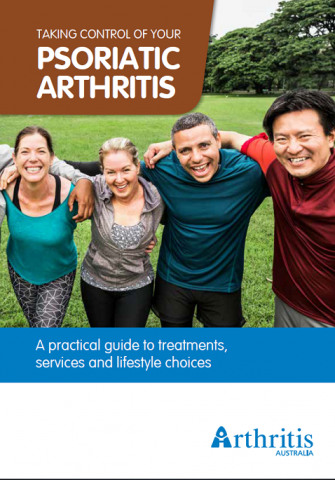What is psoriatic arthritis?
Psoriatic arthritis is a condition that causes inflammation of the joints. This causes the joints to become painful, stiff and often swollen. Usually only people who have a skin disease called psoriasis are affected by psoriatic arthritis. Only one or two out of every 10 people with psoriasis will develop this type of arthritis.
What are the symptoms?
Psoriatic arthritis can affect any joint in the body and symptoms can vary from person to person. It can develop slowly with mild symptoms, or come on quickly and be severe. The most common symptoms are:
- pain, swelling and stiffness in one or more joints
- pain and stiffness in the buttocks, lower back or neck (also known as spondylitis, meaning inflammation of the spine)
- pain in tendons, such as at the back of the heel or sole of the foot (tendons are the strong cords that attach muscles onto bones)
- changes in nails, such as thickening, colour change or separation from the skin
- pain and redness in the eyes.
What causes it?
The exact cause of psoriatic arthritis is not known. Genetics, the immune system and environmental factors, such as an infection, may play roles in causing this type of arthritis. This has yet to be proven in research. A certain gene called HLA-B27 is associated with psoriatic arthritis, especially inflammation of the spine. However this is a perfectly normal gene and there are many more people who have this gene and do not get psoriatic arthritis.
How is it diagnosed?
Your doctor will diagnose psoriatic arthritis from your symptoms and a physical examination. Your skin will be examined for signs of psoriasis, if you have not been diagnosed with this already. There is no specific test for psoriatic arthritis. However your doctor may order blood tests for inflammation, such as the erythrocyte sedimentation rate (ESR) test. Blood tests may also help to rule out other types of arthritis. If your doctor suspects you have psoriatic arthritis you should be referred to a rheumatologist, a doctor who specialises in arthritis.
What will happen to me?
With the right treatment, most people with psoriatic arthritis can lead full and active lives. However the course of psoriatic arthritis is variable and no two cases are the same. Many people find their symptoms worsen at times (known as a ‘flare’) and then settle down for a period of time. About one in 20 people with psoriatic arthritis will develop a more severe, destructive form which can cause deformity to the joints in the hands and/or feet. Most people with psoriatic arthritis will need some ongoing treatment to control their symptoms and prevent damage to the joints. This is usually managed by a rheumatologist.
Is there a cure for psoriatic arthritis?
Currently there is no cure for psoriatic arthritis. However treatment for psoriatic arthritis has improved dramatically, with new medicines that are extremely helpful in controlling the condition. Be wary of any products or therapies that claim to cure psoriatic arthritis.
What treatments are there for psoriatic arthritis?
Your rheumatologist will tailor your treatment to your symptoms and how severe your condition is. There is no way of predicting exactly which treatment will work best for you. Your doctor may need to trial several different treatments before finding the one that is right for you and may include medicines, such as:
- non-steroidal anti-inflammatory drugs (NSAIDs)
- disease-modifying anti-rheumatic drugs (DMARDs)
- biological DMARDs.
For more information see the Australian Rheumatology Association’s Patient Medicine Information or see the Medicines & Arthritis information sheet.
What can I do?
1. See a rheumatologist. A rheumatologist can diagnose psoriatic arthritis and make sure you get the right treatment to help your symptoms and prevent future problems. If you have psoriatic arthritis and have not seen a rheumatologist, ask your doctor to consider referring you. See the Working with your healthcare team information sheet.
2. Learn about psoriatic arthritis and play an active role in your treatment. Not all information you read or hear about is trustworthy so always talk to your doctor or healthcare team about treatments you are thinking about trying. Self management courses aim to help you develop skills to be actively involved in your healthcare. Contact your local Arthritis TAS on 1800 011 041 for information.
3. Learn ways to manage pain. See the Dealing with Pain information sheet.
4. Live a healthy life. Stay physically active, eat a healthy diet, stop smoking and reduce stress to help your overall health and well-being. See the Physical Activity and Healthy Eating information sheets.
5. Learn how to look after your joints. See the Fatigue & Arthritis information sheet.
6. Acknowledge your feelings and seek support. As there is currently no cure for psoriatic arthritis, it is natural to feel scared, frustrated, sad and sometimes angry. Be aware of these feelings and get help if they start affecting your daily life. See the Emotional Wellbeing information sheet.
Download this information as a PDF document: Psoriatic Arthritis
Download the Psoriatic Arthritis booklet
For further information, contact our Arthritis Infoline on 1800 011 041
